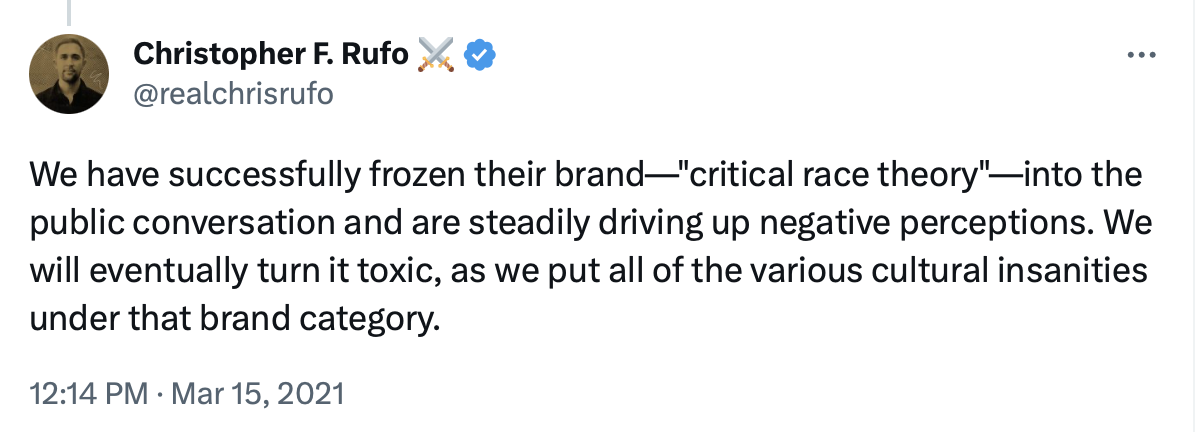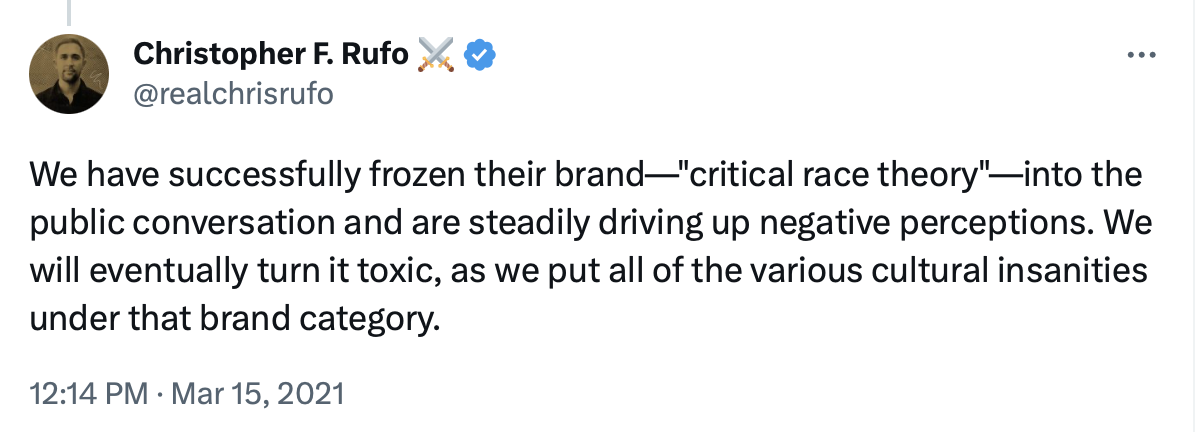By publishing Christopher Rufo, the New York Times demonstrates contempt for its readers

The first and last thing you need to know about Christopher Rufo is that he is a liar; a propagandist. This is not a controversial or tendentious claim; it is the simple meaning of Rufo’s own most famous public statement, in which he announced his strategy of turning “critical race theory” toxic by “put[ting] all of the various cultural insanities under that broad category”:

By Christopher Rufo’s own admission, when he uses phrases like “critical race theory,” he uses them dishonestly, discrediting them by linking them to things they have nothing to do with. That’s Rufo’s own description of Rufo’s modus operandi: Attempting to pick and win culture wars based not on a debate of ideas but on a dishonest campaign of distortion and obfuscation. Not only is it impossible to trust anything such a man says, it is impossible to trust even that he believes anything he says.
Today’s New York Times inflicts upon readers a 1,400 word op-ed1 by Rufo, which he concludes by professing to believe in a “shared commitment to truth.”2

A simple threshold question when deciding whether to publish an op-ed is: Does the writer believe this? Is it in good faith? This is a hard test to fail, but still an important one to apply. It’s a hard test to fail mostly because journalists often profess an unwillingness to “read someone’s mind” and are thus not eager to conclude that someone is being intentionally dishonest. But Christopher Rufo has publicly described his approach to propaganda. We don’t need to read his mind to know whether he operates in good faith; he has told us he does not. We don’t need to read Rufo’s mind to know whether his use of phrases “critical race theory,” “DEI programs, and “liberal education,” or his descriptions of what they entail, are honest; he has told us they are not.
Christopher Rufo’s entire approach to these debates is fundamentally dishonest; he has publicly announced as much. Therefore publishing Rufo is an act of dishonesty. It is an intentional effort to mislead your customers; to present them with arguments you know to be dishonest. That’s what The New York Times did today.
The Times’ own published standards for guest essays acknowledges the importance of not publishing bullshit, even in the opinion section:
We will work to verify the facts in your article, but as the writer, you bear the ultimate responsibility for the accuracy of your work. We cannot fix anything after publication without appending a correction — and corrections are permanently archived. Past errors are a factor when we consider whether to accept future work from a writer.
If “past errors” are a factor when deciding whether to accept a submission, surely past admission of being a propagandist should be, as well.
Two years ago, New York Times opinion editor Kathleen Kingsbury was asked in a Reddit AMA “What makes an Opinion article worthy of publication?” Kingsbury’s response concluded:
We also insist on a set of principles. We hope to enforce rules for grammar and style. We demand certain standards of cogent argument, logical thought and compelling rhetoric. We require transparency about the identities of writers and their motives.
Elsewhere in the AMA, Kingsbury wrote:
We aim to be a place where honest debate is elevated, where ideas are pressure-tested. Opinion is and will be a place where our audiences will hear from those with whom they agree and disagree, where they can learn from those whose lives they've never considered, and where they can grapple with the challenges of our changing world. That is our mission.
None of this is consistent with publishing an admitted propagandist. There’s nothing “honest” about the debate such a person engages in; there’s nothing people can learn from them. There is nothing “cogent” about their argument or logical about their thought. But by presenting the work of an admitted propagandist in an opinion section that claims these values, the Times gives it the veneer of respectability. It tells its readers You might not agree with Christopher Rufo, but these are his sincere ideas, and they are worth grappling with. But that isn’t true. Rufo’s words are not sincere; they are designed to mislead his audience and obscure his true intent.
The most perverse thing about all of this is that describing himself as a propagandist and announcing his intent to deceive didn’t hurt Christopher Rufo at all — to the contrary, news companies like The New York Times take him more seriously because of it. Describing himself as untrustworthy was a marketing ploy, and it worked on his intended audience: The nation’s leading journalists and editors. If Rufo was just some run-of-the-mill right-winger, the Times (probably) wouldn’t have published him.3 But because Rufo announced a grand strategy behind his lies, the Times views him as an important voice and hands him the world’s most valuable op-ed space.
It is worth noting that the Times likely reached out to Rufo and asked him to submit an essay — he probably didn’t cold pitch the Times. That’s how these things often work. As Kingsbury said on Reddit:
[W]e always welcome submissions […] Most guest essays, however, are usually collaborations when an editor of ours has an idea and assigns it to a writer. Frequently we report out who the best writer is for a specific idea, sometimes that is a writer we work with a lot and sometimes it is an expert that we’re working with for the first time.
Overall, we try to be very intentional.
Intentional, indeed.
The New York Times knows exactly what it’s doing when it publishes an admitted propagandist like Christopher Rufo. And so should you.
The Times recently decided to start calling these “guest essays.” I’ve been calling them “op-eds” for like 40 years; good luck trying to get me to stop. ↩
To preempt the “debate the ideas, not the person” crowd: No. Nobody is under any obligation to engage with an argument advanced by an admitted propagandist. Insisting that his argument be grappled with is like insisting that a statistician play a game of three card monte to see who has the better grasp of probabilities. Also I’m not linking to it for reasons I trust are obvious. ↩
There are, of course, ample counter examples. Just yesterday Ron DeSantis fired a young staffer for getting caught making and spreading Nazi propaganda. The staffer, Nate Hochman, was previously employed as a staff writer by the National Review where he churned out replacement-level right-wing nonsense. The New York Times was, for some reason, enamored enough with Hochman to have featured him in more than a half dozen articles and essays in recent years — and last summer the Times published a 4,200 word essay by Hochman. Along with “does this guy actually believe this BS” another good question editors might consider asking before publishing an op-ed is “does this guy dabble in Nazi stuff?” ↩
Member discussion